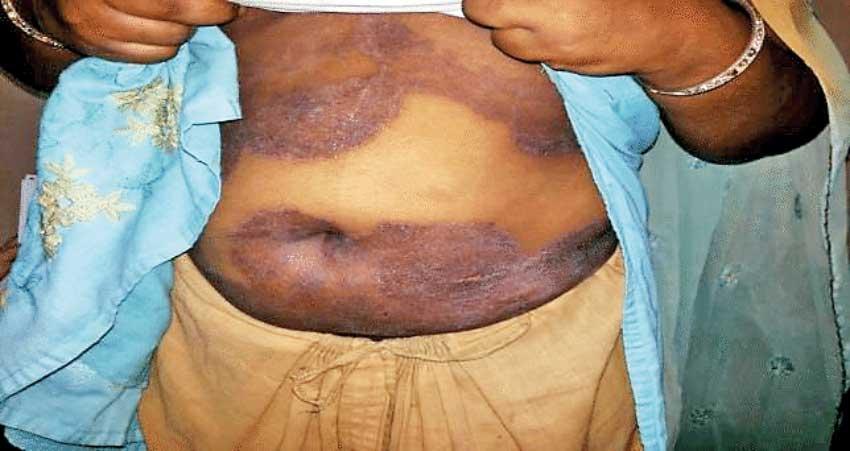06 Aug 2021 - {{hitsCtrl.values.hits}}

Tinea occurrence around the waist
 Recently a news article created a stir regarding Ringworm Disease also known as Tinea. Speaking to Daily Mirror, Dr Nayani Madarasingha, Consultant Dermatologist at National Institute of Infectious Diseases, stated that there was no need to be alarmed about the disease. “This disease is not something that just appeared, it has been here for a long time. Ringworm disease is caused by a type of fungus known as a dermatophyte,” said Dr Madarasingha.
Recently a news article created a stir regarding Ringworm Disease also known as Tinea. Speaking to Daily Mirror, Dr Nayani Madarasingha, Consultant Dermatologist at National Institute of Infectious Diseases, stated that there was no need to be alarmed about the disease. “This disease is not something that just appeared, it has been here for a long time. Ringworm disease is caused by a type of fungus known as a dermatophyte,” said Dr Madarasingha.
She noted that this was a common skin disease where the fungus affects the keratin containing cells (skin, hair and nails). “The fungus affects the superficial skin layer thus the disease is not fatal,” stated Dr Madarasingha.
The symptoms of the disease can differ according to the site of infection. A red round patch with a usually clear center, margin with red bumps and extensive scaling can be seen when the infection occurs on the skin. This is mostly seen on flexures but can be widespread too. When scalp is infected, red scaly patches and areas of hair loss are seen. When toe webs are infected, a whitish thick plaque like material is visible between the toes and blisters too could develop after some time. Redness and scaling may also be present in the palms or the soles.
Hot and humid weather 
Commenting on the rise of the disease which happened over the last few years, Dr Madarasingha opined that a possible reason could be the current hot and humid weather in the South Asian region. “But there are other causative factors for this disease,” she said, adding that the factors were poor personal hygiene, wearing tight fitting clothes and wearing closed toe shoes for a long period of time. She also revealed that immunocompromised people such as those with diabetes, cancer and those who’ve recently had an organ transplant have a higher risk of contracting the disease. “This is mostly transmitted via person to person contact. The disease can be transmitted through sharing of clothes, towels and beddings with an infected person. Even coming in contact with the surfaces touched by the infected person can cause the transmission of the disease,” she explained.
Why has it become harder to treat?
Due to the itchy nature of the disease, people may seek quick relief from it using certain combination medications that contain steroids and antifungal drugs, this had resulted in the increasing extensiveness of the disease. “These drugs provide quick relief but causes the disease to become extensive which would result in longer treatment duration and can also be difficult to treat,” cautioned Dr Madarasingha. She also pointed out that another reason for this could be antifungal resistance which is a result of patients not following the treatment properly. “When symptoms disappear a few days into the treatment, patients discontinue the treatment. This should not be done, because even though the symptoms disappear, it does not mean the patient is fully cured. Therefore, a re-emergence of the disease could occur and it could be more extensive,” she warned. A more extensive form of the disease would require a longer treatment period and stronger drugs to be used.
What should I do if I get infected?
“At the earliest sign of the disease, seek medical care. It is easier to cure the disease in the early stages,” she stated adding that for mild cases of the disease, topical creams are prescribed while in severe cases, oral antifungal drugs are prescribed for a specified period. “The treatment must be followed for the specified period and if the condition persists, please visit the dermatologist again. Please don’t attempt to change the treatment duration without the advice of the dermatologist or self-medicate as it can cause more harm than relief,” warned Dr Madarasingha.
How to prevent from it?
Following proper personal hygiene and avoiding sharing of clothes, towels and combs, not wearing tight clothes and closed toe shoes for long time are the preventive measures one can take to prevent getting infected, according to Dr Madarasingha.
20 Dec 2024 9 hours ago
20 Dec 2024 20 Dec 2024
20 Dec 2024 20 Dec 2024
20 Dec 2024 20 Dec 2024
20 Dec 2024 20 Dec 2024